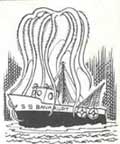A sea invasion
A sea invasion

AN AQUATIC army of American origin has invaded the Black Sea and is wreaking havoc on the fisheries there. Small jellyfish-like, tentacled creatures called ctenophores arrived there in 1982, hiding in the ballast waters of a ship travelling across the Atlantic Ocean. They lay low and reproduced, emerging in full force in the late 1980s (Science Vol 262, No 5138). "This is clearly one of the most outstanding global invasion stories in the last 50 years," says exotic species invasion expert James Carlton of Williams College in Connecticut.
The voracious ctenophore (Mnemiopsis leidyi) devours plankton and the eggs and larvae of fish. Russian fishery experts point out these creatures at times constitute 95 per cent of the biomass in the Black Sea. The Black Sea fisheries has lost an estimated $250 million and in the adjacent Azov Lake, the fisheries have shut down because catches dropped by about 200,000 tonnes.
Experts from the affected countries and the United Nations Environment Programme are struggling to deal with the ctenophore. Some suggest using pesticides, but others fear this may kill useful species. The idea of introducing a Mnemiopsis-specific disease has been mooted, but scientists know little of such diseases. Moreover, they fear a parasite or predator released to combat the pest may itself turn into a greater threat.







